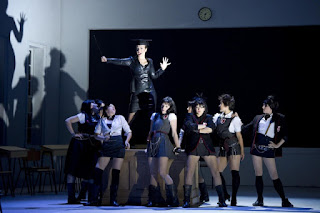Some thoughts on Rinaldo - Glyndebourne 2011
Rinaldo was the young Handel’s sixth opera but the first written for the London stage, which brought him resounding success in England. Ultimately, it led to the composer’s move to this country and eventually to his obtaining British citizenship in 1727. Rinaldo was premiered at the Queen’s Theatre, Haymarket, on 24th February 1711, only one day after the composer’s 26th birthday. The title role in the original production was sung by one of the greatest castrati of the day, the famous Nicolo Francesco Grimaldi, better known as Nicolini, which possibly contributed considerably to the success of the piece, alongside its spectacular, extravagant settings designed by Aaron Hill, the then manager of the theatre. In 1731, Handel revived the opera and re-wrote the score. The part of Rinaldo fell this time to the celebrated and equally famous castrato Senesino (real name: Francesco Bernardi) but the composer made many other fundamental changes. For example, another leading role, Goffredo, was sung by a tenor while it was written for an alto in the original score. The version presented at Glyndebourne appeared to be the original - at least in vocal terms!
Handel's opera Rinaldo takes place during the Siege of Jerusalem in 1099, represented here by public schoolboys versus St. Trinian’s. So jolly hockey sticks against lacrosse sticks? Super fun, you might think, and a rather good background for all the youthful amour and magical manipulations that form the heart of this Handel opera? Yes, it’s funny and undeniably entertaining in places, but by the end it’s rather juvenile humour wears thin as it’s relevance to Handel decreases and his drama becomes more and more trivialised.
The main feature of the story is that the knight Rinaldo is in love with Almirena, daughter of Goffredo, aka Godfrey of Bouillon, one of the military leaders of the First Crusade. After the expected success against the enemy, they will marry. Alarmed at the prospect of losing, the Saracen chief, Argante, calls on the sorceress Armida for help, and she promises to remove Rinaldo from the battle. Her girls ('Furies') abduct Almirena, and attract Rinaldo onto a boat to find her, bringing him to Armida’s magic realm. She herself then appears as Almirena, and though she can’t fool Rinaldo she certainly deceives her beloved Argante, who admits his passion for this new vision of femininity. This infuriates Armida, who finds herself falling for Rinaldo.
Alright, it’s schoolboy romance stuff, but did that validate director Robert Carsen’s decision to play the whole thing in terms of schoolboys and girls, along with the odd teacher? A sort of Harry Potter meets the Crusades, played out in the mind of a bullied schoolboy? And for goodness sake, I know I was brought up in the days of Billy Bunter and the Bash Street Kids in the good old days, but I did think caning had gone out of school years ago. But maybe Carson didn’t know that? However un-PC these days, the audience seemed to find it hilarious! Anyway, Armida herself, wonderfully sung by Brenda Rae, is here a stunningly attractive teacher (or was she a dominatrix?) in a tight black rubber dress. Her pretty brunette pupils are St Trinians terrors in short skirts and fishnet tights, and the bass role of Argante, superbly sung here by Luca Pisaroni, was a similarly transformed fellow teacher.
Almirena, who was charmingly sung by Anett Fritsch, is Rinaldo’s teenage love interest, and Armenian mezzo, Varduhi Abrahamyan made a very handsome Goffredo. Sonia Prina sang well and looked the part (appropriate for this production) as an excellently schoolboyish Rinaldo.
But here comes the problem to me. We have here a situation where two ‘teachers’ fall in love with two pupils. Is that sort of thing thing what we want to see on stage in a comedy? And the very fact that it is obviously sending up the story of RInaldo trivialises any sense I had of the drama. So Almirena’s great aria goes for absolutely nothing as she’s tied to a bedpost ogled at by Argante - fine in Handel's original, but in this case he happens to be a 'teacher' ogling at a teen girl?
In case I sound completely lacking in humour, there are plenty of laughs of the teenage variety to be had here. I dare say teens new to Handel's opera loved it. The thing is well sung and incredibly well staged by the cast - it had to be! There was so much action that had to be choreographed. Just wish there had been more of G F Handel’s intentions.
Having said this, and having seen some of the utter abominations that pass for productions of Handel operas - and Rinaldo in particular - Carson's production does at least merit the fact that it is at least entertaining and watchable! When you consider the dreadful general moronic standard of what passes for regietheatre these days that might not be saying much, but we must be thankful for small mercies! Your kids will probably love it!




Comments
Post a Comment